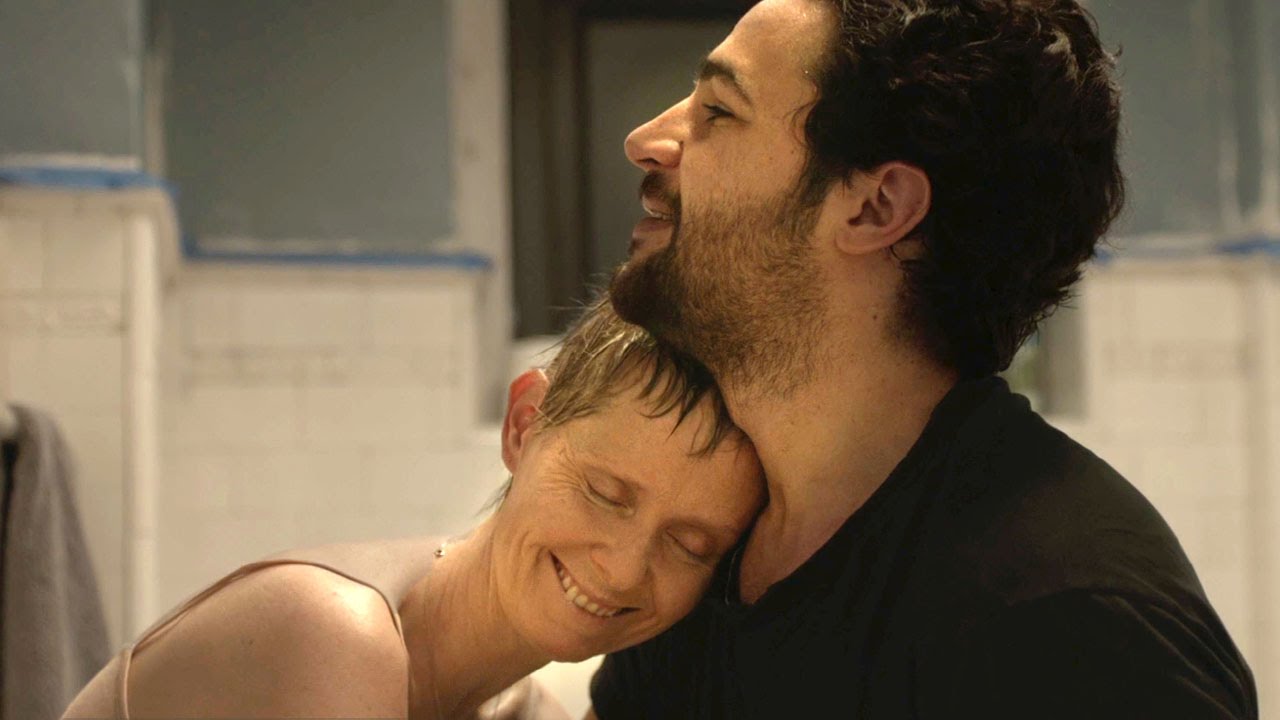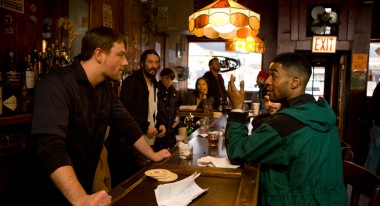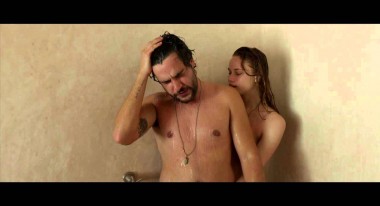 Back to selection
Back to selection
True Crit
Weekly film reviews. by Howard Feinstein
Love and Death: James White
 Cynthia Nixon and Christopher Abbott in James White
Cynthia Nixon and Christopher Abbott in James White Bereavement brackets James White. At the beginning of producer Josh Mond’s impressive directorial debut, we encounter the nearly catatonic eponymous character to the accompaniment of a drug-enhanced, inside-the-mind sound mix: Bursts of blasting synthesized music vie for dominance with smoother, softer fragments from Ray Charles and Billie Holiday. Sweaty, stinky, loaded, and dressed down in his signature raggedy sweatshirt and hoodie after a full night of clubbing, drinking, and pill popping, twentysomething James (Christopher Abbott, no longer the pretty, slender androgyne hooked on Allison Williams in Girls, but hefty and hirsute, hopefully for role construction) barrels past dressed-up adults in the hallway of a respectable Upper West Side residential building. Late as usual, he is rushing to the apartment where shiva is being held for his recently departed father.

No matter that James was estranged from his dad and that his folks had long been divorced (he didn’t know that he had a stepmother until a week before he passed away): His low-key, socially adept mother, Gail (Cynthia Nixon), hosts the gathering in her place. The gesture is heartfelt and generous: The reserved schoolteacher and avid bibliophile is not Jewish; her ex-husband’s current wife and stepdaughter, Asian-Americans, appear to be out of their element; and even though cancer is slowing her down, she summons the energy to accomplish her goal.
James is the opposite of his learned mom. There are giveaways in the film about his intelligence, but his vocabulary is limited to simple phrases, “I need to go get a smoke” and “I really need some water” topping the list. An archetypal hedonist and slacker, rough-edged, contentious, and bellicose, he has been crashing on her couch for at least three years. It’s a tossup whether his chief motivation in doing so is refusing to take control of his life or trying, in vain, to fulfill the responsibilities of Gail’s principal caregiver.
This is not a one-way street. Their relationship is textbook co-dependency. She serves as chief mediator between her son and the rest of society. James does not even give lip service to propriety. “Breathe deeply” and “Take a breath” are frequent commands with which she calms her self-destructive, out-of-control only child. (Need I bother add unemployed?) The arrangement may not function very well, but their strong, slightly unhealthy love connection compensates for its deficiencies.
The passing months noted by on-screen text mark Gail’s deterioration as well as glimpses of James’s reaction to her altered condition. He manages to get through the most dehumanizing moments she endures. Mond does not shy away from such unappealing details as scatological misfires. Earlier Gail had advised him to learn to navigate the space between the low lows and high highs which she claims curse them both. The big question is, Now that he has had to get outside himself enough to assist his increasingly helpless mother, can James rearrange some of the elements inside that mental morass to positive effect? From the start, we know the film’s finale, completing the framing device. What impact will the loss of the two people who have loved him unconditionally have on this frisky party animal who lives his unevolved life to the fullest?

Who knows? Throughout the film, Mond refuses to spell things out. We don’t get much back story or causal explanation. The movie is like life itself, at times intentionally disjointed, rather raw and unembellished. He has developed his own style, very different from that of either of his partners at Borderline Films, Antonio Campos and Sean Durkin. The jury’s in: He’s an emerged talent. In addition, he gets points for overcoming the emotional drain that necessarily accompanies a semi-autobiographical film about personal tragedy.
Without indulging in cliché, Mond acknowledges the twin primal influences, maternal and paternal, that form James’s character. We only see James’s father on a video stupidly played at the shiva of his wedding to wife number two. (I would say that James White is a bit like Woody Allen minus the comedy, but scenes like the one in which James throws out all the mourners upon seeing the wedding tape are outrageously funny.)
But we do know of his dad from comments made by others, scattered pieces of a puzzle. Gail tells James to write down his thoughts because he has not dealt with issues between him and his father that he had mentioned. While rejecting the sloppily dressed young man at a formal job interview at New York Magazine, a family friend and editor tells him that, in the writing sample this wannabe author has submitted (in lazy longhand) he succeeds in finding his father’s voice. Isolated clues, but who his father was and how he affected his son remain unanswered queries. We do get the sense, however, that James may be competing with his father’s legacy — and we’re not even sure what that is.
Visually, James is at the center of this widescreen movie, frequently with lots of empty space surrounding him. He is often shown, symmetrically, in close-up, whether he is still, or genius DP Mátyás Erdély (Miss Bala) is filming the fast-moving young man in a lengthy forward or reverse tracking shot. None of this is simple in mostly handheld camera work. He occupies the middle thematically as well, judging by the title and Abbott’s fierce presence as the troubled son. Yet the underplaying Nixon, as she often does by virtue of her special talent, unconsciously takes some of the viewer’s attention away from the actor. Her gestures, language, and movements are brilliantly nuanced. No matter what else is going on, we must look at Gail.
Only one other person has value for the misanthropic James: his best friend, Nick (actor/musician Scott Mescudi, aka Kid Cudi, who composed the film’s score), who, in a sign of cinematic progress, just happens to be gay, as he just happens to be black. The two are so close that some kissing scenes were shot but later excised. Each has the other’s back at all times. James, as would be expected, tries to take advantage of a friend as selflessly devoted as Nick as much as he can, but the latter has enough sense of self to deal with it.

We see Nick matter-of-factly cruising other guys, and inviting young men to share their hotel room while Gail has gone into hospice care. The two buddies get into a bar brawl, precipitated when James calls a female customer a “cunt” for talking too loud: another episode celebrating the dark humor in unseemly excess. Nick resists stale stereotypes: During the fight, he pummels the bartender in the face multiple times. No sissy, he. (This could be construed as condoning violence were it not for the well documented history of frightened, effeminate queens in film.) But he is more than anything a nice guy, and the only person besides Gail who has any influence on James when he goes too far overboard, or on a bender — like during an extended breakdown masterfully shot in the hotel room in one continuous take. Nick, Gail, and James form a family of three, one of the various reconstituted units that have replaced the anachronistic nuclear-family model.
In spite of his unsettling behavior, James, half animal, half imp, comes off less a monster than a spoiled charmer–thanks to the twinkle in Abbott’s eyes, our identification with Gail’s unswervingly loving point of view, and our own tendency to root for someone who appears unable to beat the obstacles life places in their path. While on a trip with Nick to the resort of Tulum in Mexico (“You’re always taking breaks,” Gail says in her sweet idea of a reprimanding tone), James meets, and in his unique way gets under the skin of, a young (underage) New Yorker, Jayne (Makenzie Leigh). They begin an affair, which Mond thoroughly deromanticizes. (In one scene that undermines any sense of intimacy, she jerks him off in the shower while the distended young man faces forward.) Once they return to New York and extra duty for Gail, he holds back on the charm and simply ignores her. The guy has no patience for anyone or anything. How could he maintain a relationship? Besides, his heart belongs to Mommy.
The deaths of his parents could end up freeing James from the prison of some stage of early childhood where he is stuck. Gail notes at one point that there will not be much insurance money for him. Whether from economic necessity or lessons learned during the intense recent months, he has little option but to transform himself and unearth the merits of adapting. Death is final, but survivors have to process their loss. In James’s case, he could end up incorporating some gain.
